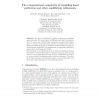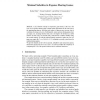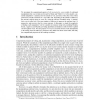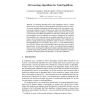122
click to vote
SAGT
2010
Springer
14 years 11 months ago
2010
Springer
We study the computational complexity of finding stable outcomes in symmetric additively-separable hedonic games. These coalition formation games are specified by an undirected e...
131
Voted
SAGT
2010
Springer
14 years 11 months ago
2010
Springer
The PPAD-completeness of Nash equilibrium computation is taken as evidence that the problem is computationally hard in the worst case. This evidence is necessarily rather weak, in ...
106
click to vote
SAGT
2010
Springer
14 years 11 months ago
2010
Springer
A key solution concept in cooperative game theory is the core. The core of an expense sharing game contains stable allocations of the total cost to the participating players, such ...
113
click to vote
SAGT
2010
Springer
14 years 11 months ago
2010
Springer
We investigate the computational aspects of safe manipulation, a new model of coalitional manipulation that was recently put forward by Slinko and White [11]. In this model, a pot...
104
click to vote
SAGT
2010
Springer
14 years 11 months ago
2010
Springer
Can learning algorithms find a Nash equilibrium? This is a natural question for several reasons. Learning algorithms resemble the behavior of players in many naturally arising gam...
105
click to vote
SAGT
2010
Springer
14 years 11 months ago
2010
Springer
Recent results showing PPAD-completeness of the problem of computing an equilibrium for Fisher’s market model under additively separable, piecewise-linear, concave utilities (pl...




